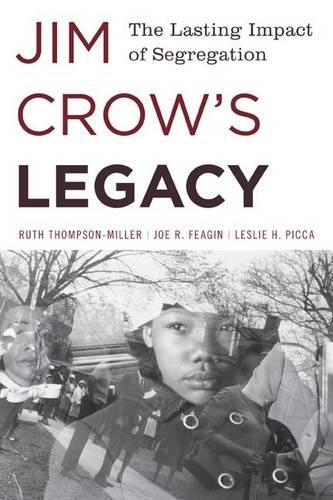
Jim Crow's Legacy: The Lasting Impact of Segregation
(Paperback)
Available Formats
Publishing Details
Jim Crow's Legacy: The Lasting Impact of Segregation
By (Author) Ruth Thompson-Miller
By (author) Joe R. Feagin
By (author) Leslie H. Picca
Bloomsbury Publishing PLC
Rowman & Littlefield Publishers
20th November 2014
United States
Classifications
Tertiary Education
Non Fiction
Social discrimination and social justice
Racism and racial discrimination / Anti-racism
305.896073
Physical Properties
Paperback
278
Width 155mm, Height 225mm, Spine 15mm
376g
Description
Jim Crows Legacy shows the lasting impact of segregation on the lives of African Americans who lived through it, as well as its impact on future generations. The book draws on interviews with elderly African American southerners whose stories poignantly show the devastation of racism not only in the past, but also in the present. The book introduces readers to the realities of the Jim Crow era for African Americansfrom life at home to work opportunities to the broader social context in America. However, the book moves beyond merely setting the scene into the powerful memories of elderly African Americans who lived through Jim Crow. Their voices tell the complex stories of their everyday livesfrom caring for white children to the racially-motivated murder of a loved one. Their stories show the pernicious impact of racism on both the past and the present. The authors use the phrase segregation stress syndrome to describe the long-term impact on physical, mental, and emotional health, as well as the unshakable influence of racism across years and generations. Jim Crows Legacy takes readers on an unparalleled journey into the bitter realities of Americas racial past and shows racisms unmistakable influence today.
Reviews
Drawing from the lived experience of African American elders refracted through the concept of the 'segregation stress syndrome,' the authors provide a rich, well-documented, and convincing examination of the 'extraordinary, deep-lying, painful, and horrific' cumulative and intergenerational consequences of the Jim Crow era notwithstanding African American resistance and resilience to racial oppression. Their investigation moves beyond a mere examination of macro-aggressions that have perpetuated racial inequality in terms of occupation, income, wealth, and other social indicators. They also lay bare mico- and meso-level ones that have had an equally deleterious impact on the physical and mental health of African Americans. This masterful book should put to rest any fanciful notions that the United States is a colorblind or post-racial society despite the considerable progress the nation has made in addressing and eliminating racial inequality since the end of legalized segregation. -- G. Reginald Daniel, University of California, Santa Barbara, co-editor of Race and the Obama Phenomenon: The Vision of a More Perfect Multiracial Union
These hidden stories of survivors of White terror situate the past at the core of the present, where accumulated privileging and dehumanization has kept the segregation stress syndrome alive across generations. Jim Crows Legacy convinces that collective trauma requires healing of society as wholean invaluable global lesson. -- Philomena Essed, Antioch University
Basing their work on the lived experiences of African Americans, Thompson-Miller, Feagin, and Picca introduce readers to a compelling and emotional account of the realities and psychological outcomes for African Americans during the Jim Crow era. Positioned within the frame of systemic racism'institutionalized structures of white-created racial oppression'the authors address the important issues of voicing the experienced realities and coping strategies by African Americans during Jim Crow segregation; the long-term psychological, physical, and economic consequences for the survivors; and the intergenerational impact of these experiences. Using the concept of 'segregation stress syndrome' to explain the collective psychological and physical outcomes of Jim Crow segregation, the authors give voice to the complexities of everyday life, from discrimination in travel, stores, and various other public spaces to rapes and murders of loved ones. Emotionally charged and intellectually stimulating, this book is must reading for anyone interested in racial relations. Summing Up: Essential. All levels/libraries. * CHOICE *
Author Bio
Ruth Thompson-Miller is assistant professor of sociology at the University of Dayton. Joe R. Feagin is Ella C. McFadden Professor of Sociology at Texas A&M University. A former president of the American Sociological Association, he is author, co-author, or editor of numerous books and articles, including The First R and The Many Costs of Racism. Leslie H. Picca is associate professor and chair of the Department of Sociology, Anthropology, and Social Work at the University of Dayton. She is the co-author of Two-Faced Racism.
